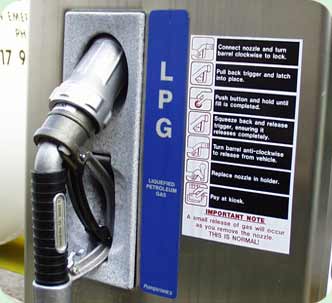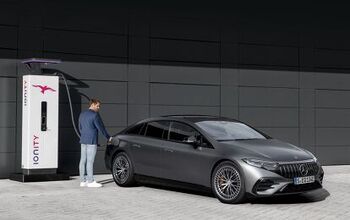LPG for Me
Robert Hefner, the author of The GET: The Grand Energy Transition, believes we should use LPG as a bridge to an EV future. He points out there are eight million vehicles in the world that operate on natural gas—though only 150,000 those are in the USA. Americans have invested nearly four trillion dollars in large cars, SUVs and trucks. Hefner asks whether we seriously intend to throw them away? Of course not, he says, and then he suggests that they should be converted to running on LPG. How difficult is that, you ask? Not much; a day’s work. (I know, my 1998 Jeep Cherokee is now a hybrid, running on gasoline or LPG at the press of a button.) Hefner says we should “retrofit all those vehicles that are now running on gas.”
Today it costs maybe $3,000 to retrofit an ICE engine to dual-use, but Hefner sees future retrofit costs of $1,500, when the number of cars being retrofitted rises.
He states the obvious: that we’d be using existing distribution infrastructure, and that we’d create a window for development of better batteries and EV solutions, while actually reducing emissions. He points out that there’s abundant LPG if we just start using it correctly.
What can I say? I just spent a couple of minutes filling LPG in the tank in my Cherokee, and it actually runs smoother on gas than on gasoline, at half the running cost, with seriously reduced CO2 emissions.
Hefner discussed The GET at the Aspen Institute recently. For the video, click here.
Brand strategist and conceptualizer. Working with communicating premium brands for manufacturers around the world.
More by Stein X Leikanger


































Comments
Join the conversation
Are CNG and LPG fueled vehicles presently avoiding all road fuel taxes?
RedStapler : You can purchase a new Civic GX, but it has a huge price premium over a comparable gas job. It makes the hybrid variant look like a bargain. But that's a CNG (natural gas) vehicle. Those are not uncommon in Europe, you can get a lot of car with CNG from the factory: Passats, Caddys, Golf wagons, Mercedes E-Class, B-Class, some Fords (C-Max, Transit...) and some Opels and Fiats. Everybody has some kind of forced induction now, turbos and/or superchargers. Last week, the package delivery verhicle that brought my new stereo was a CNG-powered Sprinter. LPG is, at least here in Germany, not available from the factory for most vehicles. Most LPC vehicles are conversions. Subaru, Chevrolet, Lada, Mazda and Chrysler dealers offer cheap conversion n new cars to spur sales. People who drive grey imported American cars (Mustangs and pickups, mostly driven by people in cowboy boots here) always have a LPG conversion. Ford has factory LPG Foci , S-Maxes, C-Maxes and Mondeos. The reason why CNG and LPG are increasingly popular in Europe is quite simple: Low taxes on the cleaner-burning fuels, compared to gasoline, to encourage the use of those. The infrastructure is there, with most larger gas stations carrying LPG and CNG. America has low taxes on gasoline to encourage careless use of that. So what. @Stein Hydrogen atoms are extremely small, and storing them requires extremely fancy schemes, as they must be captured (in some schemes, inside metal lattice structures), in order to prevent dissipation. This may be true, but as it's impossible to produce significant amounts of hydrogen atoms and keep them stable, it's not a real world problem. The hydrogen I have encountered in my professional career always appeared in the form of H2 molecules, which were quite happy in a CFD tank with a metal liner, with no measurable dissipation.
Being the owner of an LPG-powered vehicle, I'd like to react to some comments/misconceptions here: 1. LPG makes less power: In general, this is true, but not really. LPG, as a fuel, has different stoichiometric properties to petroleum. It contains less power per unit, but the octane is pretty high. Which means you can run higher compression than gasoline, more timing advance, and can run leaner. There are some wear problems when running lean on LPG, but nothing that cannot be overcome in a day and age where regular unleaded fuel provides much less lubricity than leaded fuel of just two decades before. But the fact remains that most installations see LPG making less power. But... I have on my vehicle an electronically metered LPG kit that cost me all of $800 and produces more power than my engine does on gasoline... stock. Granted, I also have a piggyback that ekes out a few more ponies on gasoline, but on the dyno, properly tuned on LPG or gasoline, there's a scant 5 horsepower difference at redline, and more power on LPG at 4500 rpms and below. And the cost of that programming fits within the $800 price tag. If you have enough demand, and proper engine tuning, you can sell kits for just $1000 that will make exactly as much power as gasoline. And they'll run just as well, too. 2. LPG / CNG / LNG: LPG is NOT CNG. Honda's Civic GX runs on CNG, which requires an ultra-heavy duty fuel tank to hold the pressurized fuel, poses an extra-explosion hazard, and costs more to tool up. An LPG tank weighs more than a regular fuel tank, because it's pressurized, but it's nowhere near as heavy or as cumbersome as a CNG tank. If a car is built for LPG and LPG only, it will only see a moderate gain in weight (about 20-25 pounds), and a mild loss of range (if you use the same tank size). Fuel economy will be slightly lower (about 10% less, given good programming), but fuel cost is 50% less. And it'll be safer. The pressurized tank is more puncture resistant, crash resistant and... bullet... resistant than your ordinary gas tank. Given the same mounting points, it poses no extra risks in a crash. Of course, LPG will burn, given a fire, but gasoline does, too. 3. LPG versus Hydrogen / Ethanol / etcetera: LPG isn't a pie-in-the-sky idea like Hydrogen... and it's not a very limited resource, either. A huge chunk of the world population cooks with LPG simply because it's damn cheap and damn plentiful. It'll get more expensive if we use it in cars, but the cost of tooling up for an LPG refilling infrastructure isn't as big as some might think. As fuel prices went up in the past two years, LPG refilling stations sprung up left and right in areas where LPG-powered vehicles were available. Even the most expensive LPG kits cost no more than $1500... and these kits preserve your car's factory power delivery and flexibility. It'd be an excellent bridge technology... requiring very tiny changes in existing vehicles for adaptation. And some processes that create biofuels also create bio-LPG as a byproduct... meaning it will still be around far into the future. --- LPG might not be the future... it's still, technically, a fossil fuel... but it's a good alternative for those willing to take the plunge.
LPG is also a much higher octane fuel, which allows you to run a higher compression engine giving more HP.